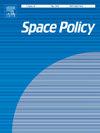Revisiting the role of space in European Security 20 years after. A practitioner's perspective
IF 1.9
4区 社会学
Q2 INTERNATIONAL RELATIONS
引用次数: 0
Abstract
This article examines the evolving role of space within the European Union's (EU) Common Security and Defence Policy (CSDP), offering a unique perspective by linking the foundational “ESDP and Space” initiative of 2002–2003 to the 2023 “EU Space Strategy for Security and Defence” (EUSSSD). The 2002–2004 period marked a turning point, with institutional cooperation and strategic vision laying the groundwork for integrating space into EU security frameworks. However, subsequent years were characterised by stagnation, missed opportunities, and fragmented approaches, particularly after the Lisbon Treaty. The 2023 EUSSSD is presented as a pivotal opportunity for the EU to reclaim its strategic momentum in space security, driven by the urgency of current geopolitical realities such as the Russia-Ukraine war. The article highlights the persistent challenges of aligning civilian and military space capabilities and overcoming structural inefficiencies that have historically impeded progress. By drawing connections between early efforts and contemporary developments, the analysis underscores the importance of cohesive action, visionary leadership, and a long-term policy to ensure the EU's competitive positioning in space security. Whether the 2023 strategy heralds a transformative “European Sputnik moment” will depend on the EU's ability to prioritise and execute its vision effectively.
20年后重新审视太空在欧洲安全中的作用。实践者的视角
本文通过将2002-2003年的基础性“ESDP与空间”倡议与2023年的“欧盟空间安全与防御战略”(EUSSSD)联系起来,探讨了空间在欧盟共同安全与防御政策(CSDP)中不断演变的作用。2002-2004年是一个转折点,机构合作和战略愿景为将空间纳入欧盟安全框架奠定了基础。然而,随后几年的特点是停滞不前、错失机遇、做法支离破碎,尤其是在《里斯本条约》(Lisbon Treaty)之后。在当前地缘政治现实(如俄乌战争)的紧迫性推动下,2023年《欧盟太空安全战略》被视为欧盟在太空安全方面恢复战略势头的关键机会。这篇文章强调了协调民用和军事空间能力以及克服历史上阻碍进步的结构性低效所面临的持续挑战。通过将早期努力与当代发展联系起来,分析强调了凝聚力行动、有远见的领导和长期政策的重要性,以确保欧盟在空间安全方面的竞争地位。2023年战略是否预示着一个变革性的“欧洲人造卫星时刻”,将取决于欧盟是否有能力优先考虑并有效执行其愿景。
本文章由计算机程序翻译,如有差异,请以英文原文为准。
求助全文
约1分钟内获得全文
求助全文
来源期刊

Space Policy
Multiple-
CiteScore
3.40
自引率
36.40%
发文量
40
期刊介绍:
Space Policy is an international, interdisciplinary journal which draws on the fields of international relations, economics, history, aerospace studies, security studies, development studies, political science and ethics to provide discussion and analysis of space activities in their political, economic, industrial, legal, cultural and social contexts. Alongside full-length papers, which are subject to a double-blind peer review system, the journal publishes opinion pieces, case studies and short reports and, in so doing, it aims to provide a forum for the exchange of ideas and opinions and a means by which authors can alert policy makers and international organizations to their views. Space Policy is also a journal of record, reproducing, in whole or part, official documents such as treaties, space agency plans or government reports relevant to the space community. Views expressed in the journal are not necessarily those of the editors or members of the editorial board.
 求助内容:
求助内容: 应助结果提醒方式:
应助结果提醒方式:


